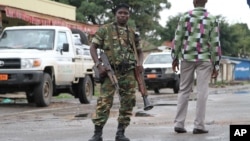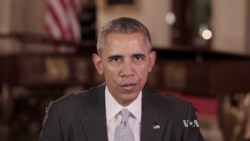A senior Burundi official says his country's government is willing to start a dialogue with the opposition, following calls for such talks by U.S. President Barack Obama and the United Nations.
Willy Nyamitwe, a senior adviser to Burundi's president, told VOA's Central Africa service Monday that a dialogue could take place either inside or outside the country. He offered few other details about the possible talks.
Nyamitwe said the government has already appointed a national commission for dialogue.
“It is like President Barack Obama had read the mind of Burundi's leaders. You know that the government has for a long time advocated for dialogue, as it believes that any political solution to Burundi's problems will come out of dialogue," he said.
Obama said in a video message broadcast Saturday on VOA that Burundi's leaders should take part in talks to end the country's political crisis and halt a growing wave of violence. He called for the talks to be internationally mediated and held outside the country. The president also said killings of innocent people and "hateful rhetoric" from Burundi's leaders are jeopardizing the Central African country's future.
State Department spokesman Mark Toner said Monday it is critical that all parties in Burundi "respect their commitments to internationally mediated dialogue." He said the U.S. administration's focus "is on encouraging and supporting the region in this push for dialogue, as well as contingency planning if the situation worsens."
Last week, the U.N. Security Council passed a resolution calling on Burundi's government to engage in a dialogue with opponents, to be mediated by Ugandan President Yoweri Museveni on behalf of the East African Community. The U.N. resolution also threatens sanctions against anyone fueling violence in Burundi.
In other developments Monday, officials in Burundi said at least four people were killed in violence overnight Sunday to Monday. They say the deaths took place during a shootout in a bar in the capital, Bujumbura. Officials also said several people were injured in violence across the city and that the mayor's house was attacked.
Political violence in Burundi has killed an estimated 240 people this year and sent more than 200,000 fleeing across the borders, with the bulk going to Rwanda.
The United States, European Union and Burundi's neighbors fear the violence could result in another civil war between Tutsis and Hutus - the same kind of fighting that brought on the 1994 Rwandan genocide that killed some 800,000 people.
Authorities in Burundi, however, said last week the country is "not in flames," and that there is no chance for mass murder.
Violent protests erupted in April when President Pierre Nkurunziza announced he would run for a third term, a move the opposition said violated term limits in the constitution. The president was re-elected in July, after surviving a failed military coup in May when he was outside the country.
The situation grew more tense this month when the government told Burundians to hand in all illegal firearms. Nkurunziza warned those who did not comply would be treated as "enemies of the nation," while the president of the Senate used the term "pulverize" to describe what would happen to opponents who ignored the government deadline.







